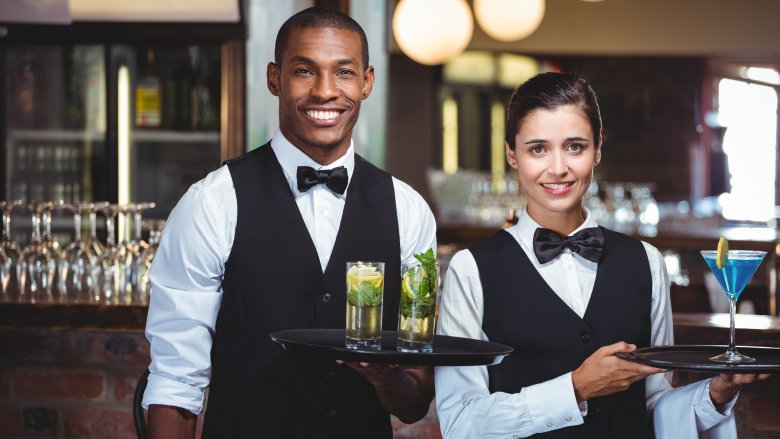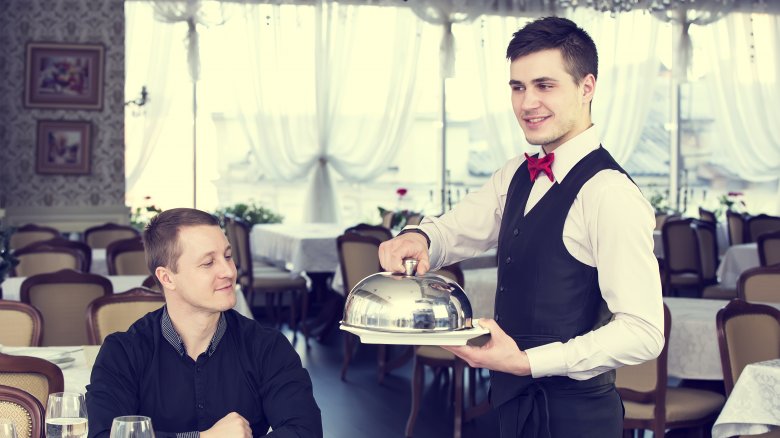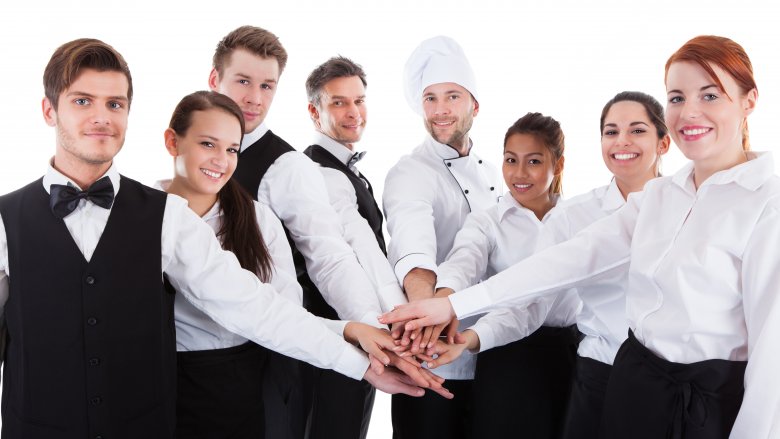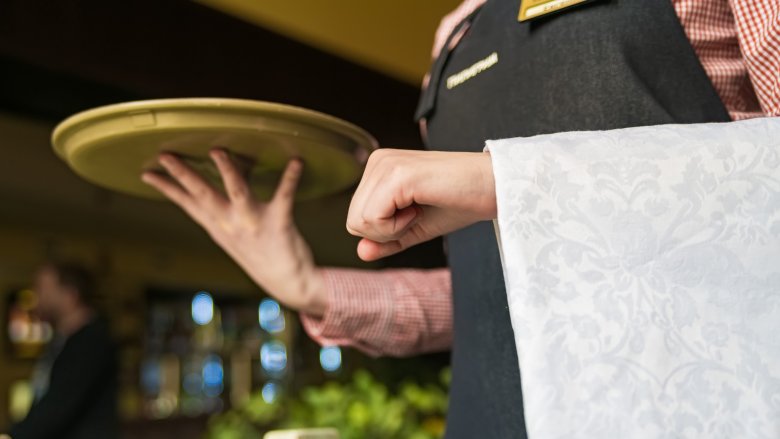The Real Reason Tipping Should Be Abolished
For most of us, it's second nature to go out for a meal and expect to add an extra chunk of change when we're paying the bill. In fact, a lot of folks (myself included) will just default to a 20 percent tip as long as the service was halfway decent and the food was up to par. And sometimes, when I get a server who goes above and beyond in providing exceptional service, I'll add even more to demonstrate my appreciation.
But tipping is actually a controversial practice for a variety of reasons that might not seem apparent if you don't work in the industry. Additionally, if you live someplace where this is not a custom, it can seem like overkill. The reality is that there are a lot of good arguments against tipping, so here are some reasons why the practice should be abolished.
Customers aren't always fair
There are some really great bartenders, waiters, and waitresses out there who have worked for years perfecting their craft. I've worked in the industry, and it's not easy, so I'm always impressed when servers can memorize an entire custom order sans pen and paper, or when mixologists can make several drinks at once without spilling a drop. And it's a treat when your server has natural social abilities, knowing exactly the right time to make a joke, start a chat, or just leave you alone with your dinner company.
But problems arise when customers don't appropriately tip servers for their exceptional service, which can happen for a variety of reasons. Some people, for example, might not understand that tipping should be based on percentages, so they'll kick down a few bucks without calculating what's customarily expected. Other people simply don't believe in tipping, so they won't leave anything at all. And then there are some people who are just downright cheap — lots of them. And it's always the server who ends up shortchanged.
In cases like these, it would be better to have the service charge built into the cost of the meal, instead of depending on customers who might not adhere to or understand standard tipping practices.
It's not a universal practice
Tipping practices vary wildly around the world. In fact, the custom of tipping in America has even caused some traditionally non-tipping cultures to embrace the practice due to American tourism abroad.
Some tipping customs are more common than others. For example, gratuity is built into the bill in many parts of the world, which used to be more common in the US with large parties at restaurants. Other regions have different percentages, usually less than the 20 percent US standard, for great service. And in some places, you just don't tip at all. In Norway, for example, it's very uncommon to tip taxi drivers or or cleaning staff at hotels. However, Norwegians may tip restaurant servers if they're exceptional, but it's not compulsory.
All of these variations are enough to make your head spin if you're a traveler. Because of this, it makes sense to do away with the practice entirely, and rely on institutions to set the standard for server compensation. That kind of streamlining will take the guesswork out of it for customers and servers alike.
It enables sexual harassment
Working in the service industry means you have to put up with a lot from customers, from general crankiness to downright rudeness. Reacting to that bad behavior could mean losing your much-needed tip.
Sometimes it goes beyond tolerating a rude customer's attitude, though. According to a report by the Restaurant Opportunities Centers United, the restaurant industry is "the single-largest source of sexual-harassment charges filed by women with the Equal Employment Opportunity Commission (EEOC)." That's an appalling fact, and managers and co-workers aren't the only offenders.
In fact, the people most likely to sexually harass waitresses are their customers — 78 percent of waitresses reported that customers made lewd comments or have sexually harassed them in some way. And while there can be recourse, if you file a complaint or say something about the customer to your manager, you're likely to lose out on those tips, which are your primary source of income.
That's a very compelling reason to abolish tipping.
Servers often aren't paid fairly
Did you know the minimum wage for servers in the majority of the United States is $2.13 per hour? And that it's been that way since 1991? Sounds crazy, right?
But it's true, and it's standard practice. The idea is that servers will generate enough money from their tips, making up for the minuscule wage business owners legally have to pay their tipped employees in all but seven states. So before tips (and before taxes come out), a waiter or waitress makes $17.04 during an eight-hour shift. You can see now just how important those tips are.
If you do well and work in a restaurant that has decent business, especially in certain regions in the US, you'll probably be okay. And employees who don't make adequate sums are supposed to be compensated by their bosses. But that isn't always a guarantee; the US Department of Labor reported a whopping 84 percent violation rate of employers not making sure their employees received proper payment.
This could be easily solved with a required service fee, which would render tipping obsolete. Or, pay tipped workers the full minimum wage as base pay, which will keep more workers out of poverty.
It makes income uncertain
If you work for an established bar or restaurant that's always packed, chances are you're doing pretty well, wage-wise. And you can probably predict your income with relative accuracy, which in turn allows you to calculate money for living expenses without worrying about how different things might be from one week to the next.
But things become problematic if you're working for a new restaurant that doesn't yet have a dedicated customer base, or for a business that's under-performing to no fault of your own. In these situations, servers can end up in a fairly uncertain income situation. It's hard to argue in favor of tipping when it creates so much uncertainty.
It enables discrimination
Putting the power of employee compensation in the hands of customers, rather than the employing establishment, leaves tipped workers at risk of discrimination. For example, one study showed that African-American servers are tipped less than their non-black counterparts by customers of all ethnicities. Another study showed that black cab drivers are tipped one-third less than their white counterparts.
There's also the issue of gender. As previously stated, women are at risk for sexual harassment from customers — making female black servers vulnerable to both harassment and lower tips. Additionally, one study showed that a woman's tips can depend on how physically attractive she is, even further proof of discrimination.
It creates unequal power dynamics
Too often, folks assume that servers and bartenders aspire to do something else professionally, or that they're just doing these jobs on the side while they're in school. This mentality feeds the misconception that service work is unskilled labor, and that working in this industry is not desirable.
Edward Frame, who earned a six-figure salary working at a Michelin-starred restaurant in 2012, wrote about this and how it relates to tipping. "Tipping normalizes this assumption. It encourages people to think of service like a perk — something extra — and not a career for millions of individuals, many of whom are compensated far less handsomely than I was. It establishes an unequal power dynamic between guests and waiters, blurring the distinction between service and servitude."
If tipping were abolished, the power dynamic between customers and servers would be vastly improved.
Tips are often divided
When you leave a tip for a server or bartender, ideally you're calculating it to reflect the quality of service you've received from that person. That makes sense as long as the tip is only going to that individual.
But because tipping can be such a persnickety method of compensation, some establishments utilize a system in which tips are pooled. It's sometimes logical do this, especially if the amount of money spent by different tables varies; one party might jack up the bill (and subsequently the tip) by ordering appetizers and alcoholic beverages, while another table could be a family with small children on a tighter budget. If tips are pooled, the server with the cheaper table won't be penalized, and everyone will be compensated fairly.
But this does create a conundrum for the tipper, and it might make them cranky to learn the tip is not going solely to the "right" person. And if there are genuinely bad or lazy employees, that could drag tips down for everyone. To pool or not to pool, then? This kind of confusion could be eliminated if tipping was jettisoned.
Servers can be biased too
Just as servers can experience discrimination from customers, so too can servers discriminate against their customers. According to a report by Michael Lynn and Glenn Withiam from the School of Hotel Administration at Cornell University, white men tend to get better service than women, people of color, the elderly, foreigners, and young people. This is likely due to the server's expectation of what kind of tip they will receive from different people, although some servers can be as racist, ageist, or sexist as anyone.
By taking tipping out of the equation, it's arguable that servers would be more inclined to treat all of their customers the same.








